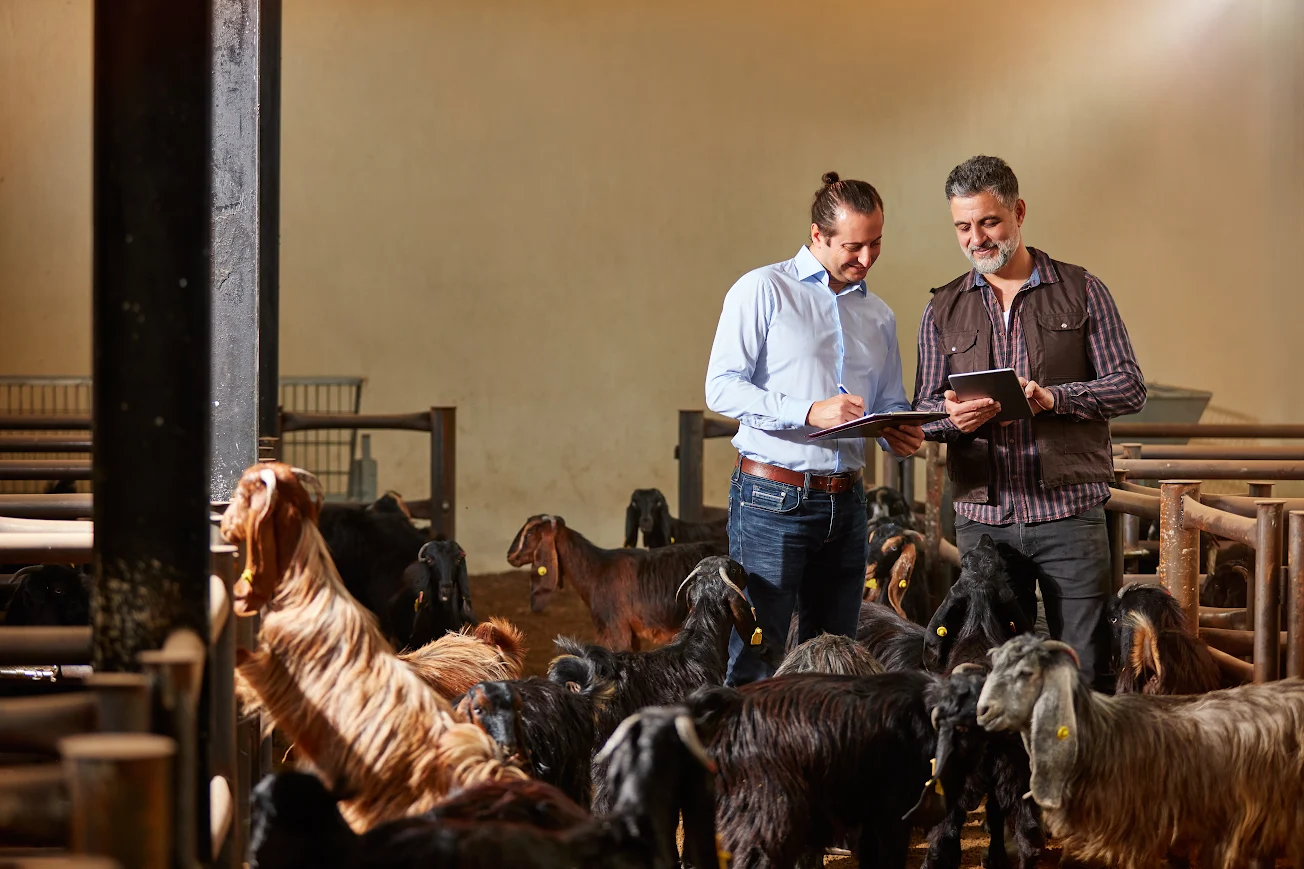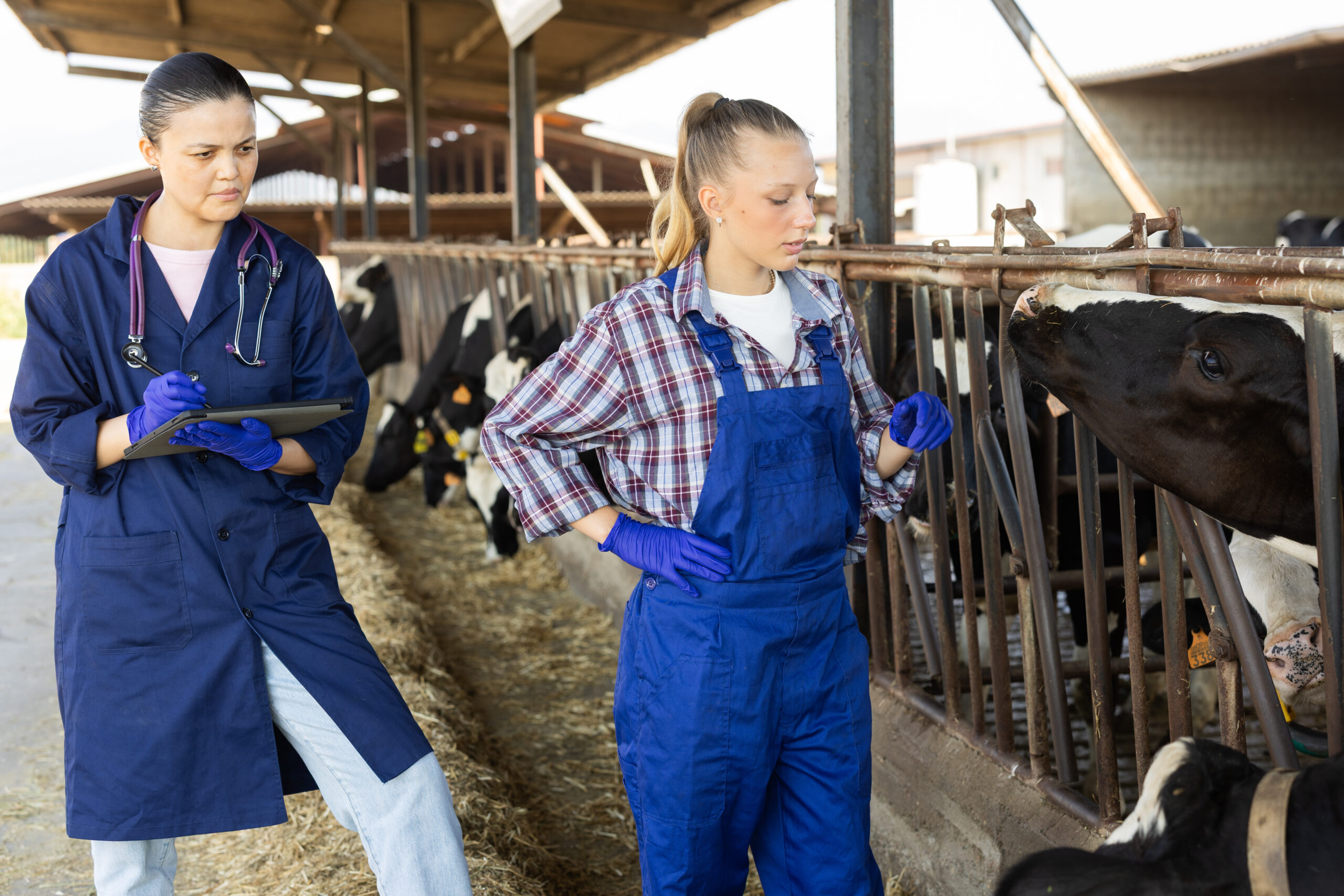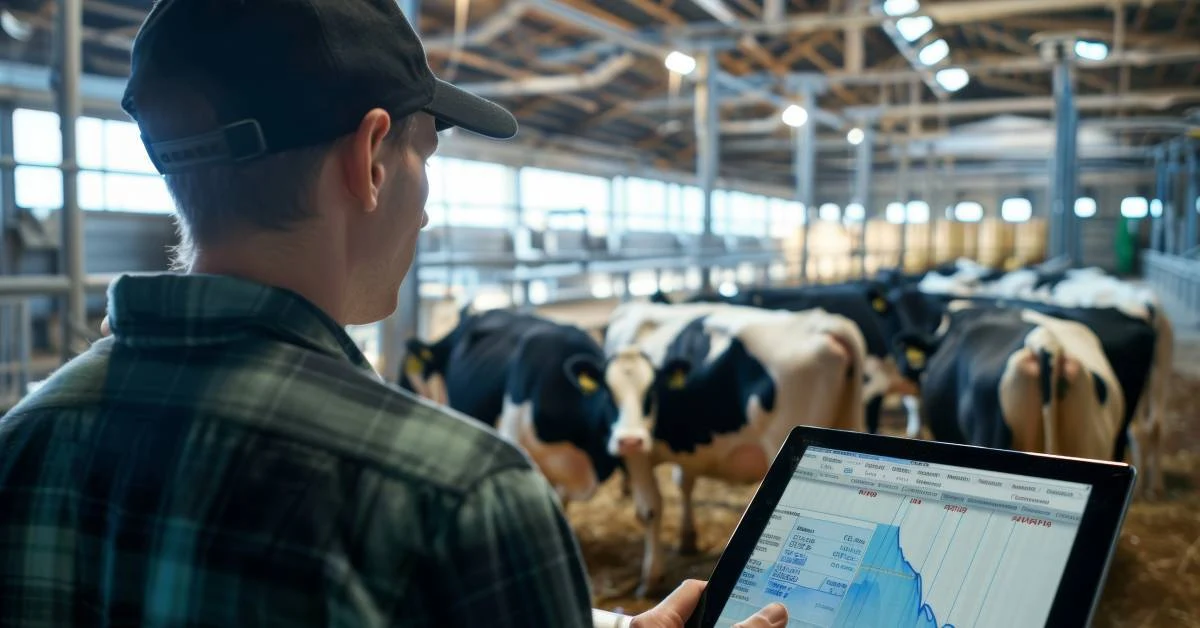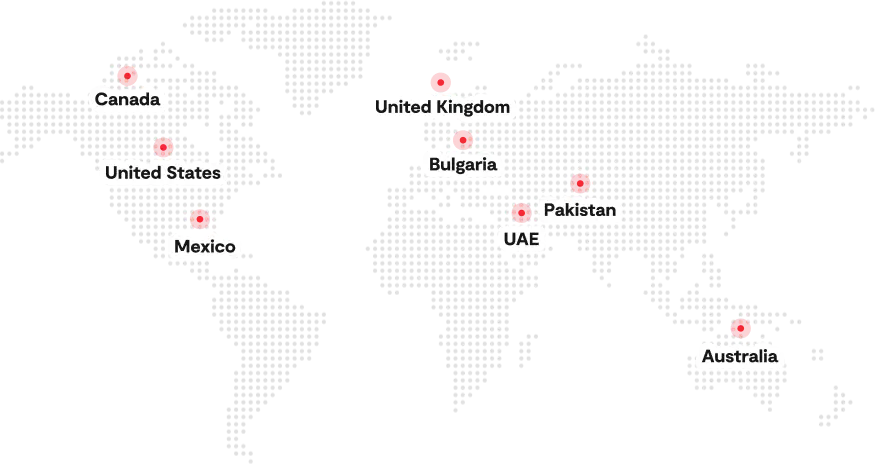For decades, farmers have relied on intuitions and assumptions to make decisions about their crops. But things have been changing quite a lot over the last few years. Farms are gradually turning into high-tech factories and adopting intensive technologies to scale their production.
As the agriculture sector becomes technologically advanced and business operations become more complex, it has become really important to manage these operations efficiently. Currently, most agribusinesses have separate management systems integrated to manage different business functions. To bring siloed data together, ERP for agriculture industry has emerged as a viable option.
Agribusinesses that have yet to explore ERP for their business or have just started using the software need to be aware of all the features and benefits of ERP. Out of all these features, customization and scalability of ERP for agriculture industry are the most important ones.
Customization allows businesses to tailor the ERP solution to their unique needs, processes, and workflows. On the other hand, scalability ensures that the ERP system can expand its functionalities and handle increased data volumes as the farm business grows.
In this blog, we will first understand the major challenges that agribusinesses are currently facing and how agriculture ERP systems help them. Then, we will explore ERP customization and scalability in detail and look at the top ERP solutions that offer these features.
What is ERP in Agriculture?
Until the 1980s, the manufacturing industry used Manufacturing Resource Planning (MRP) to manage business operations. In the early 1990s, MRPs evolved, and the concept of Enterprise Resource Planning (ERP) was introduced. Unlike MRP, ERP was able to consolidate multiple business functions into one integrated system.
The demand for ERP in the agriculture industry has grown in recent years as agribusinesses have started realizing the benefits of using ERP. According to research, companies that use ERP perform better than companies that don’t.
The increase in global food insecurity and the changing climate conditions have evoked farmers worldwide to use technology to operate their businesses more efficiently. For this, ERP serves as the best solution. It can integrate all aspects of farm management, including accounting, inventory management, production planning, sales and marketing, human resources, and more.
By using ERP for agriculture industry, stakeholders can get a holistic view of the whole farm business. They can stay updated with accurate information and have access to it all the time. This helps in making better business decisions and improves productivity and profitability.
AgriBusiness Challenges vs. ERP for Agriculture Industry
Managing farm operations is not an easy job, especially if you have limited resources available. Technology can assist in overcoming these challenges. In this section, we will look at some of the major challenges Agribusinesses face and how ERP for agriculture industry helps tackle them.
Key Challenges Faced by Agribusinesses in 2026
The most common challenges faced by agribusinesses include the following:
1. Lack of Supply chain Transparency
Monitoring products from farm to market can be quite challenging. Businesses often lack transparency, which leads to inefficiencies and quality control issues. Due to the lack of a standardized tracking system, products can not be fully traced at every point of the supply chain. This raises concerns about whether compliance requirements are being fulfilled throughout the supply chain.
2. Ineffective Data Management
These days, farmers have installed several technologies on their farms, such as sensors, drones, and IoT. Huge amounts of data are received from all of these devices, and storing that data, standardizing it in the same format, and making useful analysis out of it is a difficult task.
3. Regulatory Compliance Complexities
Due to growing consumer concerns over food safety and environmental sustainability, food safety regulations have become more stringent. Organizations like FAO and USDA have laid down many standards that farmers must follow to ensure the safety of food produced and delivered to the consumer.
If not controlled through proper food management systems, meeting these compliance requirements can be costly, time-consuming, and complex.
4. Inaccurate Financial Reporting
Agribusinesses often face the challenge of inaccurate financial reporting and properly tracking their income and expenses. Inadequate financial reporting systems often lead to farm business failure, as businesses cannot have a true picture of their financial condition and make wrong decisions based on that.
5. Lack of Farmer Engagement Practices
Due to limited resources and a lack of internet connectivity, farmers usually lack the proper tools to engage with their teams on farms. This results in an inconsistent supply of agricultural produce and quality issues. This hindrance to communication also affects relationships with suppliers.
How Can ERP Solution Be a Game Changer?
ERP for agriculture industry has the potential to resolve all the above-mentioned challenges of agribusinesses. It can also offer features beyond these challenges to help farm businesses become more profitable.
ERP can integrate all the business functions in one place and provide stakeholders with real-time information about every function. They can stay updated about everything and make quick decisions whenever needed.
ERP for agriculture industry may simplify data management procedures by centralizing and standardizing all data. Additionally, it can offer advanced analytics features to analyze this data and deliver insightful information that will help you make wise decisions.
Agribusinesses can use ERP’s compliance management tools to ensure compliance with all food safety laws and requirements. Additionally, they can monitor their compliance status at any moment to avoid supply chain delays and major penalties.
Through accurate financial reporting and analysis, ERP for agriculture industry can help agribusinesses make better decisions about investing in new technologies, managing costs, and improving profitability. It can also provide CRM tools for effective customer management, leading to higher customer retention rates.
ERP can help close the gap between farmers and consumers by allowing them to interact with customers, gauge market demand, and manage crop production as needed. Additionally, it may help stakeholders collaborate, making the supply chain more effective.
Customization of ERP for Agriculture
ERP customization refers to making modifications to the original ERP software. When a business thinks it needs additional features or functionalities other than the existing ones, it can then opt for customization.
ERP customization is time-consuming and labor-intensive as it involves modifying the code. Customization includes adding new fields, form layouts, dashboard widgets, and developing data exports.
The Importance of Customization in the Agriculture Industry
While ERP customization can be a long process, it still benefits farm businesses looking to fulfill their specific business requirements through ERP for agriculture industry.
The following are three key points that show the importance of ERP customization:
1. Tailored to Agriculture Processes
Most ERPs are designed for use by companies in any industry. However, each industry, including agriculture, has its own requirements. Through ERP customization, agribusinesses can easily incorporate features and functions such as crop monitoring, weather forecasting, and demand planning. This ensures that the ERP system is tailored to fit their unique processes and operations.
2. Improved Reporting
Customized ERP allows businesses to create custom reports based on what they want to see and measure. For instance, in ERP for agriculture industry, agribusinesses can create reports on crop yields, market demand, and sales forecasting. With accurate data on these reports, stakeholders can stay informed about their business condition and make quick decisions.
3. Compliance with Regulatory Requirements
In the agriculture industry, businesses must follow stringent regulations to ensure food safety. To meet these requirements, agribusinesses can customize their ERP to include compliance management tools. This will help them track and monitor their compliance status, avoiding potential violations and penalties.
5 Essential Tips For ERP Customization
Following are the top 5 tips that can be useful for farm businesses looking to customize their ERP solution:
1. Define Business Requirements
The first step towards ERP customization involves properly understanding business requirements. You should look at the features of the current ERP system and identify the functionalities that are missing and that you need in your ERP. For example, if you are a farm business, you might need integration with IoT devices used on farms.
2. Consult with the ERP Vendor
Before a business decides on customization in ERP implementation, it is important to consult the ERP vendor to understand the costs and customization process. This will help you better understand what is possible and make informed decisions about the ERP.
3. Document Every Single Change
As customization involves changing the source code, it is crucial to document every change made, whether small or big. Keeping track of the modifications is important to resolve any implementation issues. Also, you might need to look back at these changes if any bugs arise in the future.
4. Focus on User Experience
Although customization in ERP implementation brings many benefits, one thing that businesses need to be wary of is that these customizations enhance user experience. This is because, at the end of the day, no matter how many functionalities are added, your employees will need to use those functions. If the user experience is not good, they might not be able to fully utilize the system.
5. Test and Validate Customizations
Once the ERP is modified, it needs to be constantly tested and validated to make sure that it is operating correctly. This will ensure that all customizations are working as intended and there are no unexpected issues or bugs.
Scalability of Agricultural ERP Systems
ERP system scalability refers to the ability of ERP to adapt to the changing needs of the business as the business scales up or scales down. As agriculture businesses grow, their requirements change, and they need to upgrade their ERP system. Investing in ERP can be a huge cost for businesses; hence, it is important to make sure that the ERP system the business is implementing is scalable so that it brings long-term benefits.
For example, as the farm business expands, it might use more devices like drones and sensors to collect data. ERP for agriculture industry needs to be capable enough to handle the increasing data volumes well.
Secondly, a business might want to tap into international markets for which it might need additional language features and fulfill compliance requirements. In that case, the ERP system should be able to adapt to these changes without requiring a complete overhaul.
The Importance of Scalability in the Agriculture Industry
For sustainable growth, the scalability of ERP for agriculture industry plays a very important role. Following are some of the ways where ERP scalability helps:
1. Accommodate Business Growth
ERP scalability ensures that the ERP can accommodate business growth. As agribusinesses expand their operations, they need to add more users and process more data. A scalable ERP system can handle these changes without any disruptions or performance delays.
It might be possible that as business grows, business units increase. For example, a farm business might start exporting its products internationally. In that case, a scalable ERP will always facilitate such change and grow seamlessly with the business.
2. Optimize Resource Utilization
A scalable ERP for agriculture industry efficiently allocates resources. During periods of peak activity, such as harvest season or planting season, the system can handle high volumes of data and users simultaneously. When the workload decreases, resources can be allocated to other tasks or scaled down to minimize costs.
3. Facilitate Technology Integration
As businesses adopt new technologies, such as IoT devices, AI, and blockchain, integration with the ERP system becomes essential. A scalable ERP system can easily integrate with these technologies, allowing businesses to stay competitive and optimize their processes. Furthermore, as new technologies continue to emerge, a scalable ERP system can adapt and integrate with them in the future.
Top 5 ERP Solutions for Agriculture
Here’s a list of the top five ERP solutions to help farm businesses identify the right one according to the size of their business and their specific needs:
1. FarmERP
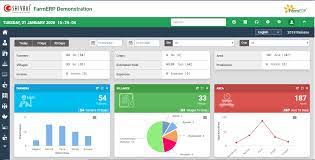
FarmERP is a farm management platform that integrates advanced technologies for streamlined strategies in agriculture. It is a highly scalable and configurable software platform that helps agribusinesses achieve profitability and sustainability.
By using FarmERP, businesses can make their supply chain more transparent and make sure that all the necessary compliance requirements are fulfilled.
2. Folio3 AgTech
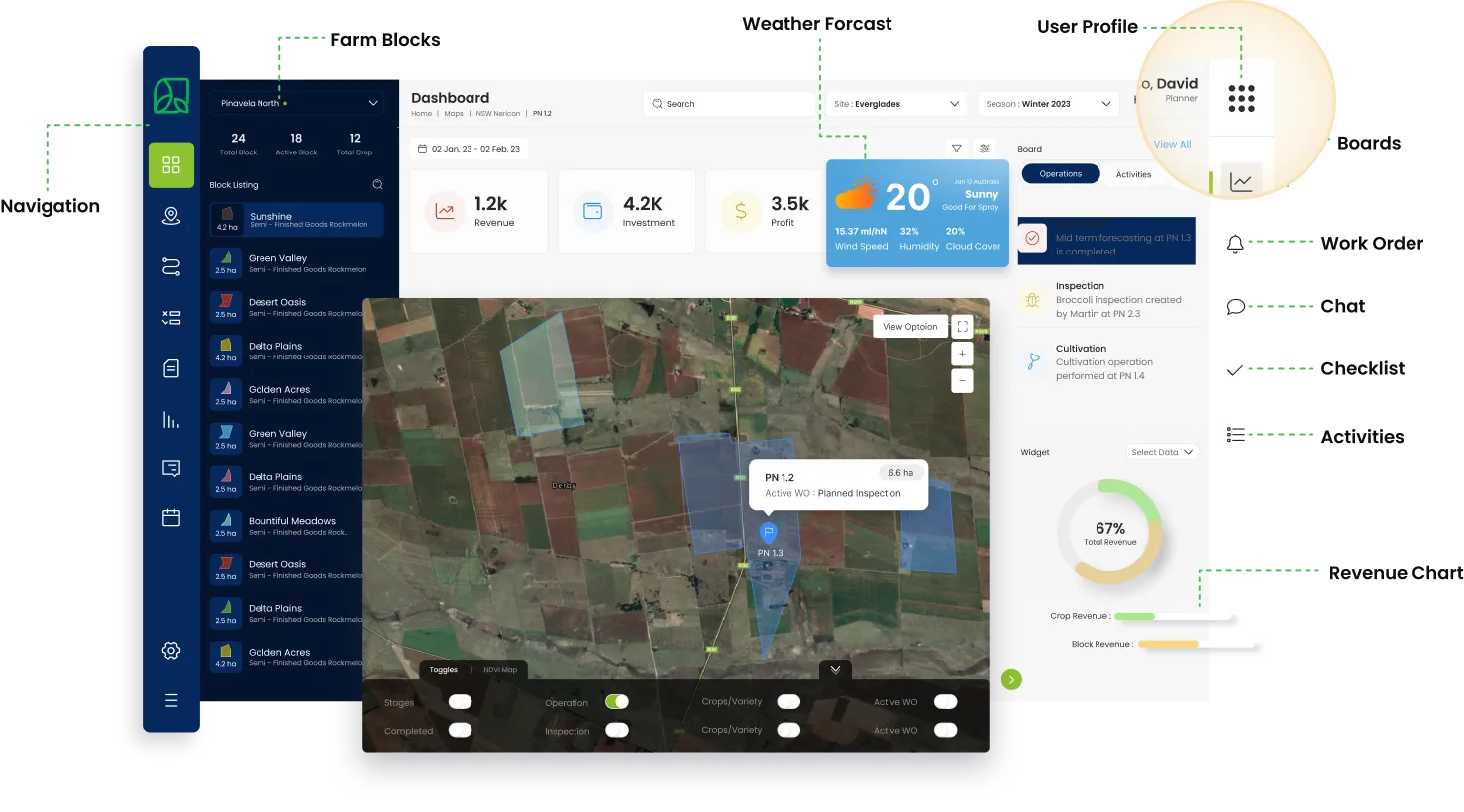
Folio3 AgTech has been helping agribusinesses with their digital transformation for over twenty years. It offers one of the best ERP for agriculture industry, with all the required features. Advanced analytics enable predictive farming and crop yield forecasting.
Moreover, in animal agriculture, the ERP software by Folio3 AgTech can help herd managers breed, track cattle health, and monitor growth with real-time insights.
By catering to both crop and livestock operations, ERP for agriculture industry by Folio3 has uplifted several agribusinesses to efficiently manage their entire operations from farm to fork, drive profits, and thrive in a competitive market.
3. Oracle Netsuite
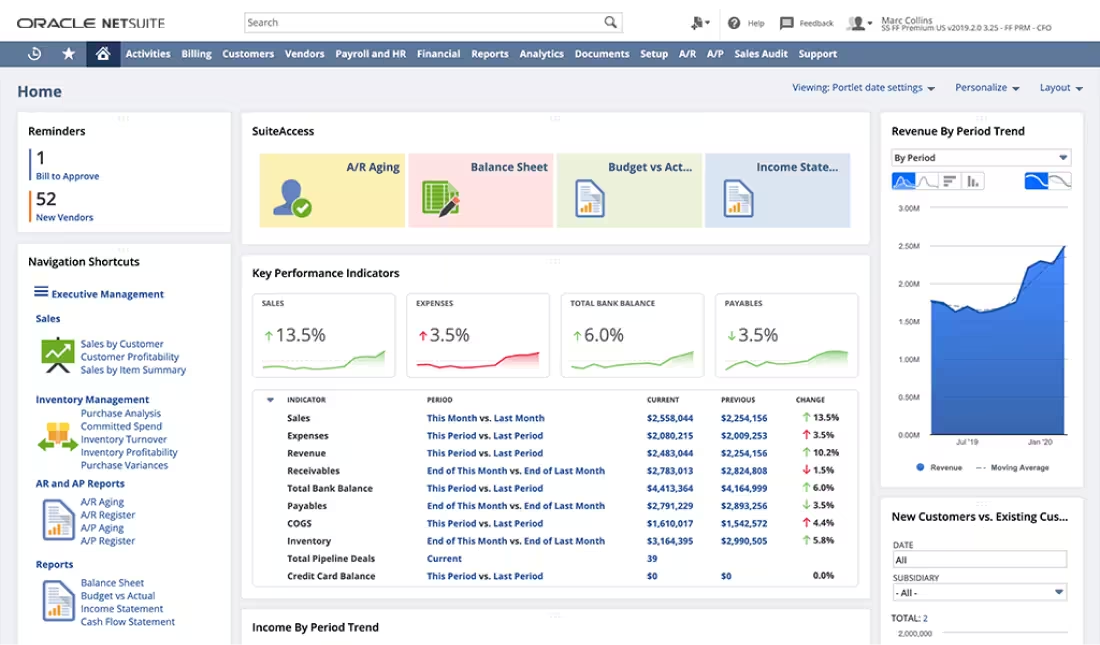
Netsuite is one of the oldest ERP software programs. It provides comprehensive solutions to businesses integrating different functions into one software program. In ERP for agriculture industry, Netsuite has a strong footprint as it helps multiple agribusinesses manage their different business operations.
Using Netsuite for Agriculture, agribusinesses can manage each stage of their crop growth and get real-time insights into their farms.
4. SAP Agriculture

SAP agriculture is an ERP for agriculture industry designed specifically for agribusinesses’ needs and requirements. It provides tools for resource optimization, inventory management, and real-time monitoring of agricultural activities.
Through SAP, farmers can get real-time insights and make informed decisions about their farms. The mobile version of the software allows farmers to easily manage operations regardless of where they are.
5. Agvance
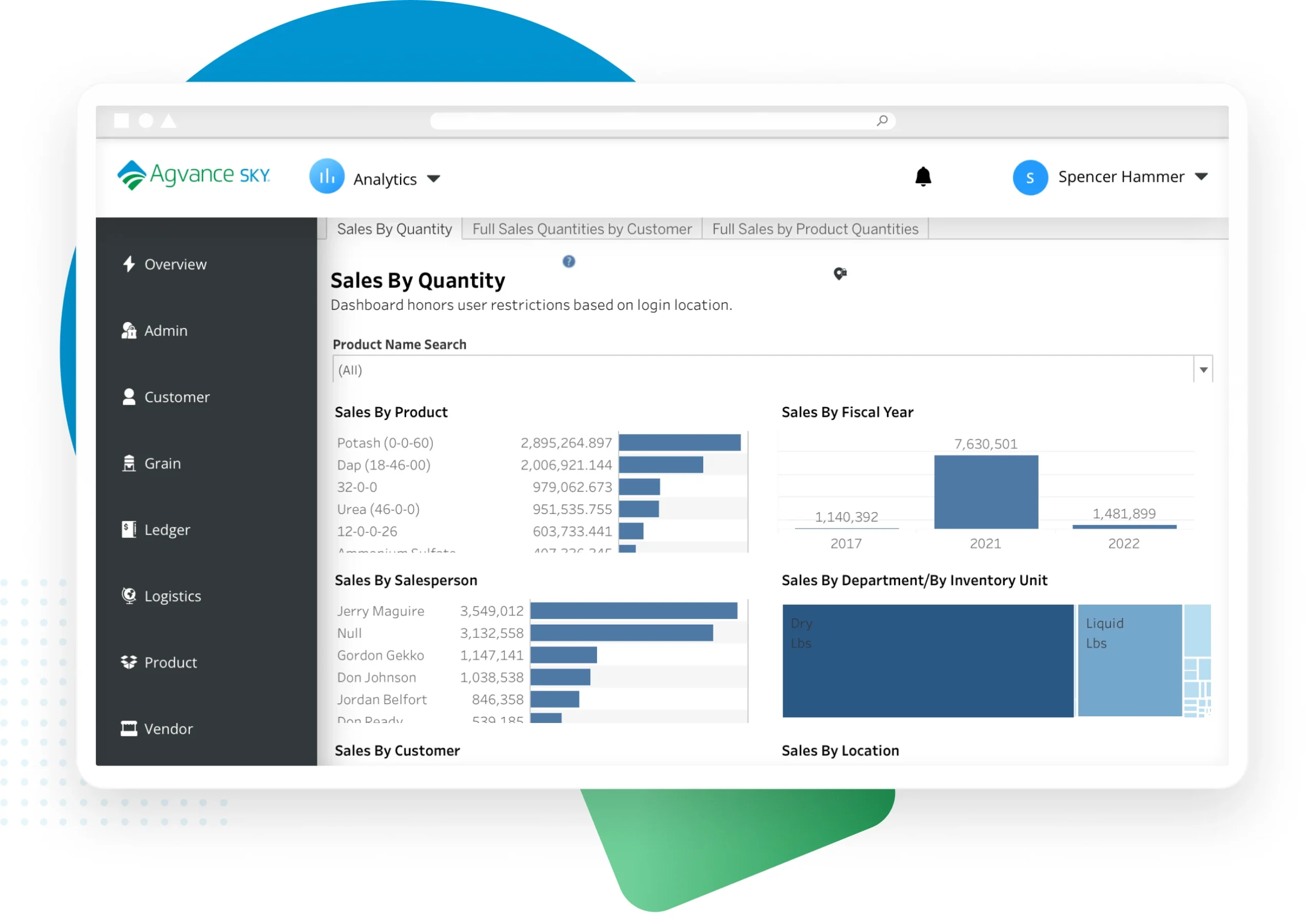
While SAP and Netsuite cater to all types of industries, Agvance is solely designed ERP for agriculture industry. It offers various features such as financial management, inventory control, precision farming, and more.
Agvance allows agribusinesses to streamline their seed management operations, access field maps on their mobiles, and stay updated at all times.
How Folio3 AgTech Helps Businesses in Smooth ERP Implementation
As a Microsoft Gold partner and Oracle Netsuite alliance partner, Folio3 ATech has been providing ERP for agriculture industry for over twenty years. ERP by Folio3 AgTech covers around 7 modules, from supply chain management to sales and contract management, covering every part of the business function.
The ERP solution is highly scalable and can be customized according to business requirements. It allows you to create custom reports based on your own KPIs and metrics. Moreover, the system can add more features and functions if your farm business grows in the future.
The platform is cloud-based, making it accessible from any device with an internet connection. It can easily integrate with the existing systems and provides multiple language features if a business wants to expand globally.
The ERP implementation process can usually be time-consuming and challenging for the farm business since this industry is not very tech-savvy compared to the rest. However, with Folio3 AgTech, ERP implementation can be done quite smoothly.
With over 1000 clients and over 5,000 projects, Folio3 AgTech has a very efficient 8-step ERP implementation process. It begins with discovery calls to identify farm businesses’ needs. After this, project goals are set, and ERP development begins.
Once rigorous quality assurance testing is completed, the ERP is integrated with the existing business operations. Data from old systems and spreadsheets is smoothly transferred to the new system, and continuous training and support are provided to ensure the agribusiness is comfortable using the new ERP for agriculture industry.
Conclusion
The blog has highlighted significant aspects of how ERP helps agribusinesses tackle most of the challenges. ERP brings many features for almost every business, no matter which industry it operates in. For agriculture, the flexibility and scalability of ERP have proved to be highly beneficial. It enables them to manage their operations effectively and optimize resources
By understanding the customization process and scalability factors, agribusinesses can make informed decisions when implementing an ERP system. At the same time, businesses need to find a reliable tech partner to implement ERP smoothly into their business operations. With proper planning and consideration, the right ERP system can provide agribusinesses a major competitive edge in the industry.
FAQs
Which ERP Solution is Right for Your Business?
Determining the right ERP solution for your business depends on various factors. Consider factors like the size of your business, your specific requirements, your customization needs, the growth potential of your business, and your affordability.
For agriculture businesses, Folio3 AgTech ERP is a good option with functionalities for farming and production management.
How Does ERP Help to Scale Your Business?
ERP systems are designed to be scalable. This means that if a business grows, the ERP adapts itself accordingly. A centralized data system can handle increased volumes of data and users. The scalability feature ensures that there are no disruptions caused by the increased workload.
What is Customization of ERP?
Customizing ERP refers to the process of adapting or modifying an existing ERP system to meet the specific needs and processes of a particular business. This can involve creating new modules, changing workflows, or adding features to improve functionality.
What is ERP for Sustainable Farming?
ERP for sustainable farming is specifically designed to cater to the agriculture industry. Such type of ERP solution includes features related to farming like crop monitoring, pest management, environmental impact tracking, and compliance with regulations related to sustainable farming.


